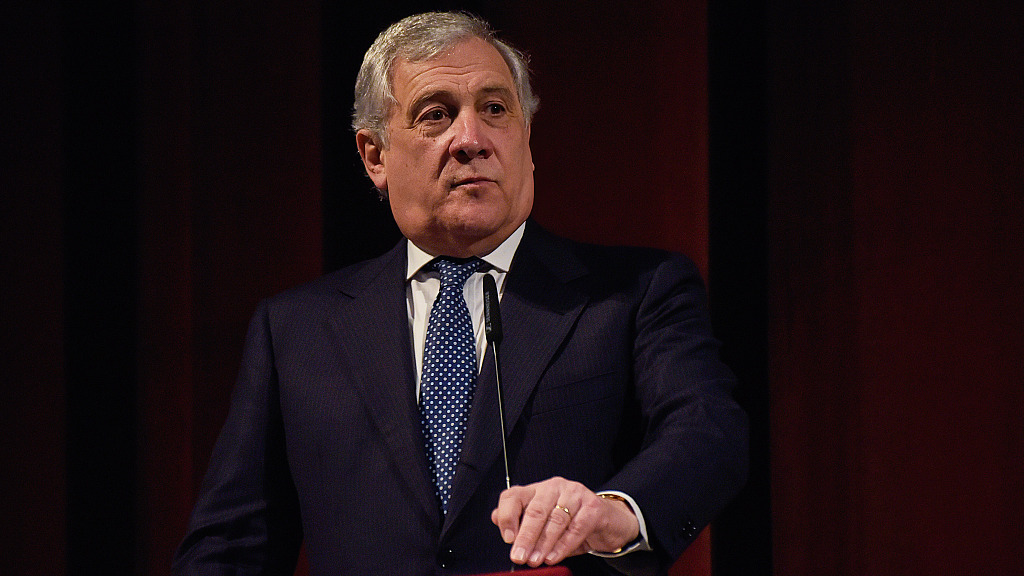
Italian Foreign Minister Antonio Tajani speaks from the stage during a presentation in Rome, Italy, January 9, 2023. /CFP
Italian Foreign Minister Antonio Tajani speaks from the stage during a presentation in Rome, Italy, January 9, 2023. /CFP
Editor's note: Hamzah Rifaat Hussain, a special commentator on current affairs for CGTN, is a host for ThinkTech Hawaii. The article reflects the author's opinions and not necessarily the views of CGTN.
Italian Foreign Minister and Vice-President of the Council of Ministers, Antonio Tajani's visit to Beijing demonstrates that Italy continues to seek meaningful cooperation with China despite the negative role of spoilers which seek to undercut bilateral ties. His arrival at the invitation of his Chinese counterpart Wang Yi will be subsequently followed with both dignitaries attending the 11th Joint Meeting of the China-Italy Government Committee.
In retrospect, the committee has an illustrious history as both Rome and Beijing have prioritized mutual development. In 2019, Italy became the first and only G7 country that signed a memorandum of understanding on cooperation within the framework of the Belt and Road Initiative (BRI). In the past few years, trade between Italy and China increased by 42 percent and almost reached $78 billion in 2022. Such historical optimism, positivity and strong bilateral ties must continue unabated. In 2023, it is expected that this positive momentum will be carried forward.
Tajani's 2023 trip comes amid significant hype from certain Western media outlets which continue to promote narratives of Italy not seeking a renewal of its BRI agreement with China.
According to Cui Heng, assistant research fellow at the Center for Russian Studies of East China Normal University, the worsening geopolitical environment and American dissemination of the "China threat" theory is preventing Italy from practicing a pragmatic foreign policy which it has done historically.
Italy stands to benefit from close cooperation with China in the absence of American pressure or agitation from nefarious elements domestically. Recall that at the 2013 Joint Meeting of the China-Italy Government Committee, Chinese Foreign Minister Wang Yi and former Italian Foreign Minister Emma Bonino reached understandings on the convergence of interests between the two sides rather than differences. References were made to China's reform measures and Beijing's promotion of "Four Modernizations" as coinciding with Italy's abundant and well-developed technologies in related areas.
The two ministers also noted that the partnership established in 2004 reached a stage of maturity, which permits structured and broad-based dialogue on global and regional themes. Such goodwill which includes understandings reached on strengthening public opinion foundations should not be held hostage to spoilers.

Visitors view exhibits during an Italy-themed exhibition held at the Hongqiao Import Commodity Exhibition and Trade Center in east China's Shanghai, May 8, 2020. /Xinhua
Visitors view exhibits during an Italy-themed exhibition held at the Hongqiao Import Commodity Exhibition and Trade Center in east China's Shanghai, May 8, 2020. /Xinhua
One should also recall the positive momentum generated from the recent 10th China-Italy Government Committee to understand what Italy stands to gain. In 2020, former Italian Foreign Minister Luigi Di Maio appreciated the pivotal role that China played in Italy's fight against the COVID-19 pandemic, while the two foreign ministers signed the Joint Document of the 10th Joint Meeting of the China-Italy Government Committee.
The importance of how agreements on trade, investments, soft power cooperation and mutual assistance were reached through solid political foundations was highlighted, which is precisely why the 11th exercise in 2023 should yield similar results.
For that to materialize, however, hostile voices in Italy need to be allayed through pragmatism and prudence from the Italian leadership. A diverse range of views on the BRI must not compromise national foreign policy priorities.
According to Cui Hongjian, director of the Department of European Studies at the China Institute of International Studies, the future of bilateral ties will partly depend on the series of interactions between the two sides during the visit by Foreign Minister Antonio Tajani. Cui further observed that the visit is a clear indication that Italy does not want to jeopardize its mutually beneficial relationship with China despite impediments and roadblocks. These include spoilers, nativists, far-right voices and those vouching against globalization and multilateralism.
Italian Defense Minister Guido Crosseto has played a negative and unfortunate role in this regard. Crosseto stated in July that Italy's participation in the BRI has done little to boost Italian exports and hence, must be shunned. However, the total trade volume between China and Italy actually increased during the past few years, with a lot of room to settle differences through dialogue and diplomacy.
As a result, Crosseto's attempt to consider China as a competitor will not serve Italy's interests. It reveals a policy which sidesteps Italy's historical approach of pragmatism in its foreign policy. Foreign Minister Tajani's 2023 visit is a testament to building momentum in bilateral ties rather than caving into spoilers.
(If you want to contribute and have specific expertise, please contact us at opinions@cgtn.com. Follow @thouse_opinions on Twitter to discover the latest commentaries in the CGTN Opinion Section.)